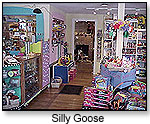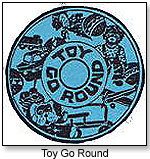
February 16, 2026

July 2008 | Vol. VII - No. 7
Why Retail May Be More Challenging Today
Climate for New Stores Is Tougher, Some Say
| “Formerly, new-business financing decisions were made on a more personal and local level.” |
Achieving success in retail today is more challenging than it was 10 years ago, four of 10 toy-store owners and experts told TDmonthly Magazine. Two believed the challenge to be about the same, while four others said success is more easily achievable now.
 Despite some advantages, many challenges and obstacles abound. A “challenge” often detracts from the bottom line but also affords a resource. An “obstacle,” however, adversely affects the bottom line without counterbalancing resource potential.
Despite some advantages, many challenges and obstacles abound. A “challenge” often detracts from the bottom line but also affords a resource. An “obstacle,” however, adversely affects the bottom line without counterbalancing resource potential.
WHAT MAKES SUCCESS?
Retha Davis of Kid’s Center in Tucson, Ariz.; Steve Levy of Toy City in Keene, N.H.; Stuart Wilkins of Vermont Toy & Hobby in Essex, Vt.; Gail Smith of Toy Go Round in Albany, Calif.; and Denise Jillson of Harvard Square Business Associates in Cambridge, Mass., indicated that success largely depends on the same factors that have always applied:
- Good planning based on good homework
- Solid financial backing for the pre-profit interval that generally spans at least two years and may, in some instances, run into the fifth year of operation
- Clear vision of a store’s identity and overall goal.
MEET THESE CHALLENGES
The most pertinent challenges specialty storeowners face are as follows:
 Create a Distinct Identity: Kid’s Center in Tucson, Ariz., and G. Wilikers in Portsmouth, N.H., have both made combining toys and children’s books a linch-pin to their success, whereas Silly Goose in Essex, Mass., has successfully diversified with novelty toys for grownups.
Create a Distinct Identity: Kid’s Center in Tucson, Ariz., and G. Wilikers in Portsmouth, N.H., have both made combining toys and children’s books a linch-pin to their success, whereas Silly Goose in Essex, Mass., has successfully diversified with novelty toys for grownups.
The Internet: Online sales have introduced new competition. Yet, Davis, Levy and Diane Somerdyk of T Bumble’s Toys in Swarthmore, Penn., said savvy Internet use affords resources and opportunities that outweigh the cons. Benefits include easier product research; connection with vendors, manufacturers and customers; and marketing opportunities, whether on their own sites or on that of a vendor host.
TACKLE THESE OBSTACLES
Somerdyk, Smith and Ben Choinski of Special Toys and More in Enfield, Conn., all classified new stores’ success prospects as worse than when they opened their stores (from 5 to 30 years ago), citing rising operating expenses and customer gas costs.
Beth Meecham, spokesperson for Manchester and Mountain Region Chamber of Commerce in Vermont, concurred. Other obstacles include the rising cost of real estate rentals, fuel for heating and driving, employee wages and the merchandise itself.
 Levy told TDmonthly that obtaining financing is also more difficult than it was 36 years ago. Formerly, new-business financing decisions were made on a more personal and local level than in today’s national and regional banking environment.
Levy told TDmonthly that obtaining financing is also more difficult than it was 36 years ago. Formerly, new-business financing decisions were made on a more personal and local level than in today’s national and regional banking environment.
Lynne Walsh of The Whiz Store in Westborough, Mass., concurred, noting that it’s harder to finance a new business today than it was even five years ago, when she and her husband, Chris, acquired their store. Today, in many regions, “local banking” has become nonexistent or nearly so.
THE BIG-BOX FACTOR: REAL OR ILLUSION?
Having been in business more than 30 years, Levy believes that competition from big-box stores isn’t particularly relevant for toy stores. Decades ago, he said, roughly the same level of competition existed from other local independent retailers.
Walsh, however, perceives mass merchants as having greater pull. She’s experienced the direct impact of a nearby big-box store as local demographics changed multiple times during a five-year period. As big-box stores dealing in toys move into the Walshes’ locality, they do see a drop-off in their business.
There can be positive effects, however. Parents shopping at a nearby Lowe’s, for example, may reward children’s tolerance with a trip to The Whiz Store, Walsh told TDmonthly.
THE NEIGHBORHOOD EFFECT
Despite increased costs and, as some see it, a fiercely competitive market, “the neighborhood effect” works magic for some businesses.
The business community at Harvard Square, Jillson told TDmonthly, has an interest in developing and maintaining a particular neighborhood identity. Landlords are sometimes willing to lower rents for businesses that would increase the neighborhood’s appeal.
Davis testified that the sense of community in a neighborhood can positively affect the success rate.
Five years ago, when Walsh and her husband, Chris, acquired The Whiz Store, they reaped the benefits of a store that had already been in business for nearly 20 years, and had a solid reputation and customer base. As Lynn put it, one “can’t beat an existing reputation.”
REASON FOR HOPE
Despite obstacles and challenges, “cautious optimism” emerged as the consensus perspective. However, regional factors bear consideration. All interviewees with optimistic perspectives were New England region respondents, whereas the Mid-Atlantic and California sources were pessimistic on success odds for new toy stores.
Copyright © 2026 TDmonthly®, a division of TOYDIRECTORY.com®,
Inc.



 Despite some advantages, many challenges and obstacles abound. A “challenge” often detracts from the bottom line but also affords a resource. An “obstacle,” however, adversely affects the bottom line without counterbalancing resource potential.
Despite some advantages, many challenges and obstacles abound. A “challenge” often detracts from the bottom line but also affords a resource. An “obstacle,” however, adversely affects the bottom line without counterbalancing resource potential. Create a Distinct Identity: Kid’s Center in Tucson, Ariz., and G. Wilikers in Portsmouth, N.H., have both made combining toys and children’s books a linch-pin to their success, whereas Silly Goose in Essex, Mass., has successfully diversified with novelty toys for grownups.
Create a Distinct Identity: Kid’s Center in Tucson, Ariz., and G. Wilikers in Portsmouth, N.H., have both made combining toys and children’s books a linch-pin to their success, whereas Silly Goose in Essex, Mass., has successfully diversified with novelty toys for grownups. Levy told TDmonthly that obtaining financing is also more difficult than it was 36 years ago. Formerly, new-business financing decisions were made on a more personal and local level than in today’s national and regional banking environment.
Levy told TDmonthly that obtaining financing is also more difficult than it was 36 years ago. Formerly, new-business financing decisions were made on a more personal and local level than in today’s national and regional banking environment.